Cinema Smackdown!: Batman (1966) vs. Batman (1989) vs. Batman Begins
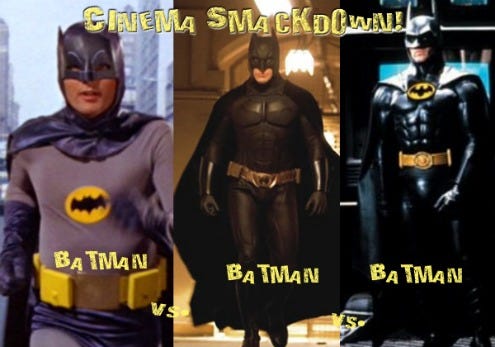
Welcome again, Film Yap Smackdown! fans! This week we have a three-way dance between the big-screen's Caped Crusaders, counting only the first films of the different big-screen incarnations of the character: the 1966 "Batman" based on the TV show starring Adam West and Burt Ward as Batman and Robin, 1989's "Batman," directed by Tim Burton and starring Michael Keaton in the title role, and 2005's "Batman Begins," starring Christian Bale and directed by Christopher Nolan.
Which of this triple threat of cowled crusaders of justice will emerge victorious? Let's find out:
Plot
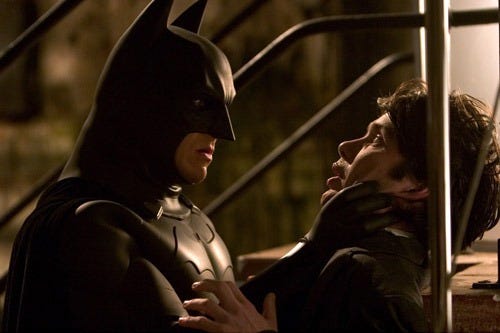
Nolan's film explored the psyche of Bruce Wayne, explored the notion of justice vs. revenge and whether a person's actions or their thoughts define who they are, plus a well-defined villain with a motivation we haven't seen in a major motion picture in quite some time. Burton altered the Batman mythos to connect the Batman and Joker characters, but is otherwise a standard good vs. evil story, while the '66 narrative about dehydrating the United Nations; representatives is just an excuse to get the "BAM"s and "POW"s on the big screen.
Advantage: Nolan
Man Behind the Mask
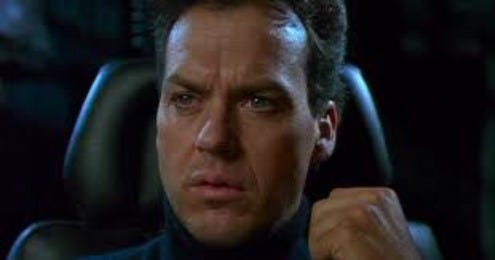
In '66 we got the campy debonair Adam West. Michael Keaton's oddball Wayne put a little madness behind the bat and for the first time we saw that perhaps Master Wayne was a tad unhinged. Nolan cast the steel-jawed Christian Bale as a champion of social justice and offers the most fully-rounded Bruce Wayne we've ever seen. Bale edges out Keaton for the nod.
Advantage: Nolan
Costume
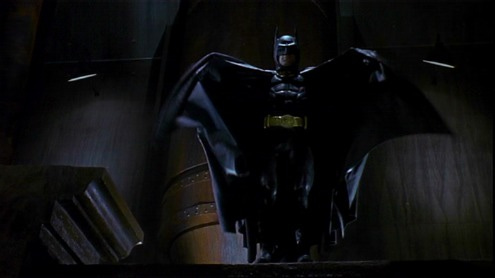
I think we can agree Adam West's tights are no match for his opponents in either form or function. Burton's Batman suit was leather-and-body-armor chic, while Nolan's first go-round featured plenty of function, with an emphasis on continual tweaking and improvements. It's close, but we're going by the first Burton suit, by, er, an ear.
Advantage: Burton
Car
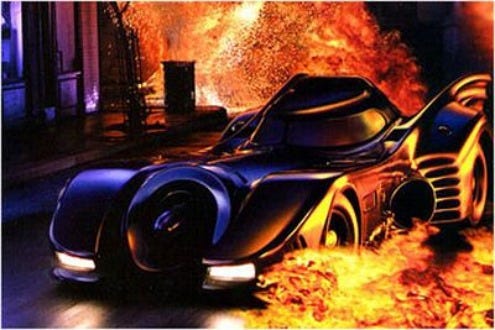
It wasn't until Val Kilmer in "Batman Forever" that we learned that chicks dig the car, but we always suspected it. The '66 version again is a classic, but doesn't hold up to the thoroughbreds of the later incarnations. Burton's car has bat-class and bat-style in spades, but the "Begins" batmobile has its own name: the Tumbler, a "bridging vehicle" designed to jump rivers for military use. It's a tank-like monstrosity, no less impressive than the Burton Batman's ride. But Burton's Batmobile is a converted corvette with machine guns, bombs, and the sweetest jet engine you'll see in a land-based vehicle. Nolan's car has the form and function, though, which gives it a leg up.
Advantage: Nolan
Gadgets

Both Keaton and Bale had their gas-powered grappling guns, while West had to rely on the hand-thrown hook. Bale had a high-tech cowl with a listening device, and both of the later Batmen had sword-proof gauntlets. In true 60s style, West had a pill for every situation. But this argument begins and ends with four little words: Bat Shark-Repellent Spray.
Advantage: '66
Villain(s)
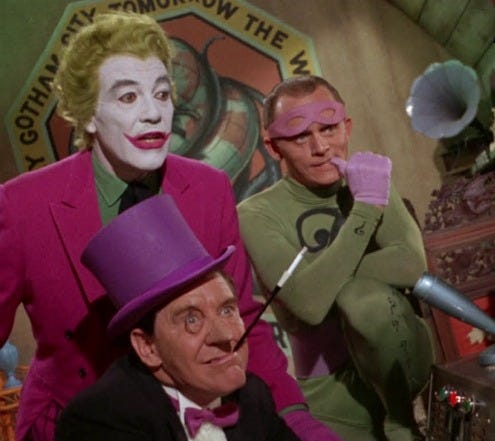
Batman '66 goes quantity over quality, as the Joker (Ceasar Romero), Riddler (Frank Gorshin), Penguin (Burgess Meredith), and Catwoman (Lee Meriweather) step all over each other in the film (remember: we're not counting TV). Nolan had Ra's Al Ghul (Ken Watanable/Liam Neeson) and the Scarecrow (Cillian Murphy), while Burton has Jack Nicholson's iconic performance as The Joker. Not much of a contest, even.
Advantage: Burton
Damsel

Unless you count Catwoman/Kitka, '66 has no real love interest for Batman. Burton brought in the photojournalist Vicki Vale (Kim Basinger), while Nolan has the idealistic assistant DA Rachel Dawes (Katie Holmes). Dawes is undoubtedly the best character of the three, but her weak portrayal by Holmes in the first film gives the smokin' hot Basinger the edge.
Advantage: Burton
Alfred
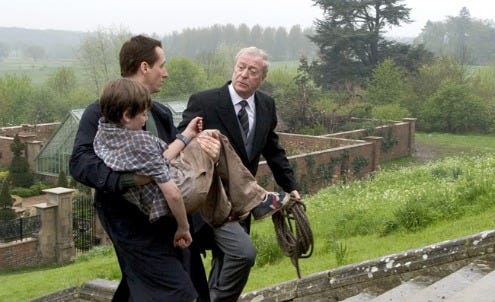
Alan Napier is virtually a background character in '66; In Burton's Michael Gough is a doting grandfather type who offers tidbits of sage advice. In "Begins," Bruce's relationship to Alfred is integral to the film, and Caine actively helps develop Batman as a persona as well as providing Bruce Wayne's moral compass.
Advantage: Nolan
Sequel(s)
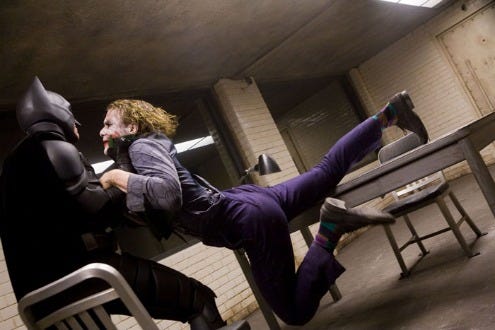
None for '66, unless you count the TV show. Burton directed "Batman Returns," an up-and-down film, then bowed out for Joel Schumacher's increasingly disastrous third and fourth films. Nolan's followup, 2008's "The Dark Knight" set a new standard for superhero films, is widely regarded as the best superhero film ever made, and is arguably the best film of that entire year.
Advantage: Nolan
Winner

The 1966 Batman is a fun long-form episode of the old TV show, but we're getting serious with our superheroes, here. Nolan's "Batman Begins" relaunched Batman to heights most never dreamed of after the disastrous failure of "Batman and Robin." Not only did Nolan improve on Burton's original darker vision of Batman, he raised the bar for all superhero movies to come. "Batman Begins," then, is THE new champion of Batman franchise starters.


